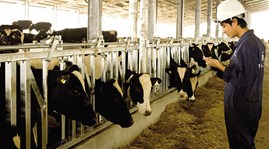
A first-eve decree on special incentives for foreign agricultural projects is tabled to help Vietnam attract more investments in this sector.
 |
A first-eve decree on special incentives for foreign agricultural projects is tabled to help Vietnam attract more investments in this sector.
The Ministry of Agriculture and Rural Development last week began to seek comments from foreign enterprises in Vietnam for the draft decree.
Under the draft, investors will enjoy preferential corporate income tax (CIT) of only 10 per cent within the first 15 years of operations, for projects in extremely difficult geographical areas, agricultural zones applying high technology, large sample field areas, and concentrated material zones. Such a CIT level will also be given to areas of special investment incentives, and agricultural enterprises with hi-tech applications.
Investors will be subject to a CIT level of 20 per cent for the first 10 years of operations, for projects in difficult geographical areas, and projects manufacturing machinery and equipment for agriculture, forestry, fishery and salt production. This also applies to projects making irrigation equipment, producing refined animal feeds, poultry and seafood, and developing traditional industries.
Additionally, investors in “special preferential projects”, a category that has yet to be defined, can enjoy a CIT exemption for the first four years of operations, and a 50 per cent CIT reduction for the next nine years. Meanwhile, investors in “preferential projects” will be exempted from CIT for the first two years of operations, and given a 50 per cent reduction for the next four years.
Also under the draft, foreign investors can receive subsidy for up to 70 per cent of vocational training costs. Total subsidy for one project shall not be over VND5 billion ($234,750).
Investors will be given the most incentive land rents, including an exemption of 15 years for preferential projects that construct housing for workers, plant trees, and build works for public welfare.
“The decree is very important to foreign investors, who have enjoyed almost no incentives in agricultural projects,” said one of the decree’s drafters, lawyer Pham Manh Dung, from Rajah & Tann LCT Lawyers.
The draft is welcomed by many foreign enterprises expecting their difficulties to be solved.
Flavio Corsin, Vietnam country manager of IDH Sustainable Trade Initiative, said foreign enterprises were currently not treated equally in comparison to local enterprises. For example, they are banned from purchasing coffee directly from farmers, and must instead go through licensed dealers.
Le Thi Khanh Hoa, representative of Swiss-backed Syngenta Vietnam, suggested that foreign companies be allowed to rent land from farmers to conduct pilot plant variety and pesticide projects.
“In the current Land Law, foreign companies are not allowed to rent land from farmers. They have to rent from industrial or export processing zones but they can’t do that because their projects must be cultivated on the fields,” she said. “The government should have an incentive policy for foreign companies to do these projects.”
(Source:VIR)




